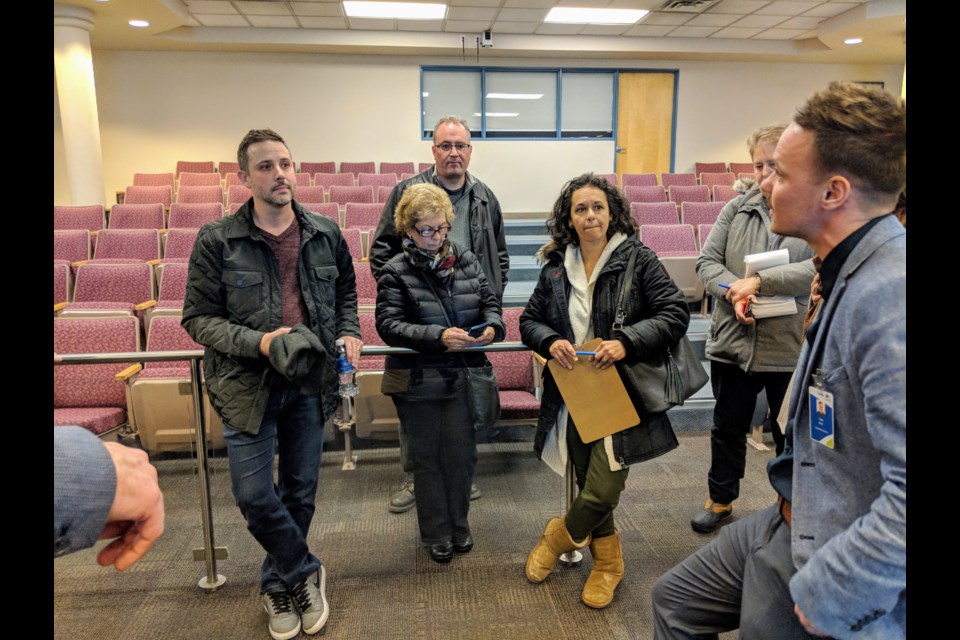For some residents, short-term rentals have already worn out their welcome.
Others say they’ve been renting Airbnb-type lodging for a decade during travel abroad and are excited that the Town of Newmarket is moving to regulate the booming industry.
Such was the divide for about 20 local homeowners who took part in an interactive public meeting Tuesday night at the Municipal Offices to share their views on the subject and learn more about the considerations being undertaken by town staff to create a set of rules, regulations and enforcement that meets the needs of residents.
“Let’s not forget we had a murder and many people are still traumatized,” said at least two homeowners who live in the Sawmill Valley Boulevard neighbourhood where an Oct. 4, 2019 targeted shooting in the driveway at a short-term rental left one man dead and a woman injured.
A father of three who lives near Upper Canada Mall, quickly chimed in, saying, “I’m just waiting for the shots to be fired”.
The area around the mall at Yonge Street and Davis Drive has seen a proliferation of short-term rentals recently, following a close second in terms of listings to the neighbourhoods surrounding Southlake Regional Health Centre.
Research conducted by town staff in October 2019 showed 170 short-term local rental units advertised on the various online platforms that connect renters and rentees.
Another resident expressed concern about the affordable housing desert that could be left in the wake of the lucrative short-term rental market.
“Why don’t we ask the people who can’t find housing what they think? Maybe affordable housing should be the moral guide when considering regulations.”
Meanwhile, longtime residents Wilma and Brian Millage say short-term rentals should be regulated to protect the community and make a good impression on visitors.
The couple have used Airbnb-type rentals while travelling for about 10 years.
“I really support making housing more affordable for the owners, as well, that’s important for a lot of people who’ve been here for a long time,” Brian said. “A lot of expenses may have gone beyond people’s retirement incomes.”
Wilma said she is “pleased to see that the town is acting quickly to consult with the public".
New town policies could be in place in early 2020.
Both say parties and noise at these rentals top their concerns, but that any policies could also take into consideration the tourism boost that could follow. They also like the idea of owners providing brochures at the residence of things to do in the area.
“The rentals that are around the hospital, it’s clear people are there for a purpose,” Brian said. “But for the others, I think a lot of them are tourism-oriented and they might welcome some local information from the owner, like where to shop, eat, entertainment options.”
Town planner Ted Horton and regulatory services director Flynn Scott presented the research the town has conducted on short-term rentals in general (without proper enforcement, less than 10 per cent of owners voluntarily register and pay licensing fees and taxes), and more specifically as it relates to what the town can regulate (parking restrictions, conduct of guests, number of guests/bedrooms per booking, for example).
Just over 60 per cent of residents who voted in poll-type questions throughout the presentation said they had all of the following concerns that were listed: noise/party homes, garbage, parking, and community safety. Only nine per cent said they had no concerns whatsoever.
Residents were also asked to cast a vote on such things as who should be allowed to obtain a short-term rental licence, whether or not the operator should be required to remain on-site while the home is booked, how many guests should be allowed to stay at one location, and should the town limit the number of days per year in which a residence can be rented short-term.
When creating its policies for short-term rentals, the town will consider the following: protecting neighbourhoods and residents, protecting long-term rental housing supply, enabling supplemental income, public safety, supporting the tourism industry, promoting regulatory equity, and encouraging compliance/enforcement.
With regard to enforcement, Scott spoke about the need to create regulations that are enforceable. For example, it would be hard to enforce a limit on the number of days an owner is renting.
As well, a complaint-driven system is being proposed that includes a staffed 24/7 hotline for telephone and email concerns (including a resident's ability to email video, photographic or audio recordings to bylaw officers), real-time outreach to operators to respond, and enforcement action.
“If the renters don’t respond, that’s a ticket, if the noise continues, that’s a ticket,” Scott said.
A demerit-point system could also be implemented and once an operator reaches the limit, he could lose his licence or have it suspended.
“So, if we were to issue a fine after three strikes, saying their licence would be pulled, they would no longer be permitted to operate within our town,” Scott said, adding it’s a highly effective tool he used in a previous job in British Columbia. “When the tickets start racking up to about $15,000 a month, you get an operator’s attention pretty quickly.”
Newmarket residents have until Jan. 3, 2020 to share their views on regulating short-term rentals in an online survey. You can also call in your feedback to the town at 905-895-5193 or email [email protected]
Based on the community's feedback and best practices, staff will provide a report to council on Feb. 3, 2020.
For more information and to view the short-term rental accomodation presentation, visit Hey Newmarket.


